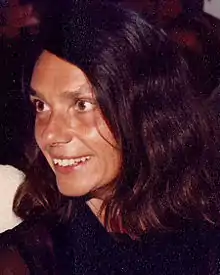Muzi Epifani
Maria Luisa Gabriella Epifani, better known as Muzi Epifani (March 18, 1935 – February 12, 1984), was an Italian writer and poet.
Muzi Epifani | |
|---|---|
 | |
| Born | Maria Luisa Gabriella Epifani March 18, 1935 Benghazi, Italian Libya |
| Died | February 12, 1984 (aged 48) Rome, Italy |
| Language | Italian |
| Nationality | Italian |
| Education | Heidelberg University |
| Alma mater | Sapienza University of Rome |
Biography
Muzi Epifani was born in Benghazi, Libya. She studied literature and philosophy at the Heidelberg University and the University of Rome La Sapienza, where she obtained a degree in aesthetics under the supervision of Emilio Garroni. She was particularly influenced by the Hermeneutics of Hans-Georg Gadamer[1] and the anthropological thought of Ernesto de Martino, whose missions she worked on in Lucania and Salento.[2] During her studies at La Sapienza, she met Alex Duran (to whom she dedicated her novel Pazzi & creature), Gabriele Giannantoni, Enzo Siciliano, and Franco Voltaggio.
Epifani was one of the first Italian writers to develop a distinctive style of female writings alongside Natalia Ginzburg, Luce d'Eramo, Dacia Maraini, Biancamaria Frabotta, Gabriella Sobrino, and Angiola Sacripante.[3] She was a very attentive reader of English female writers such as Katherine Mansfield and, above all, Virginia Woolf.
She collaborated with various newspapers, such as "l'Unità", "l'Avanti!", "Paese Sera". She was considered an environmental activist and "Il Globo" published her own innovative column on the protection of the Italian landscape and environment entitled "Article 9", in reference to the Constitution of the Republic of Italy ("The Republic promotes the development of culture and scientific and technological research, providing safeguard of the landscape and historical and artistic heritage on the Nation").[4] Epifani also worked as a journalist for RAI, Italy's national public broadcasting company, in the fields of theatre and literature.
In her “Il Premio Viareggio? La mia vita”, Gabriella Sobrino described Muzi Epifani as always "surrounded by her children".[5] They would work during the nights together "when we had finally managed to put to bed the children who would gather around us like puppies in their multi-coloured pyjamas".[6]
In 1976, her comedy "La fuga" (The escape) won the "Young Theatre" Prize. In this satirical play, Epifani intertwined a personal affair with a current political debate concerning the abortion law in Italy. The writer exposed the Italian hypocrisy of people who would permit abortion in the private sphere whilst at the same time criticising it in public. The play has been republished in 2015.[7] The new edition, introduced by the Italian writer and film-director Cristina Comencini,[8] has been presented at the Casa delle letterature in Rome (29 May 2015) by Cristina Comencini, Biancamaria Frabotta, Lucianna Di Lello and Franco Voltaggio, with readings made by the Italian actress Piera degli Esposti.
Epifani is the mother of the film director Francesca Archibugi and of the economist Daniele Archibugi, a professor at Birkbeck College, University of London.[9] She died in Rome.
Works
Novels and poetry collections
- Muzi Epifani, Cloto. Poesia,[10] Antonio Lalli Editore, Poggibonsi.
- Muzi Epifani, Infanzia di una casalinga emancipata, Prospetti, XII/48, December 1977.
- Muzi Epifani, Pazzi & creature, Rebellato, Venice 1982.
- Muzi Epifani, L'adulterio. (Il lato comico), Nuovi Argomenti, n. 16, October–December 1985.
Plays
- Muzi Epifani, La fuga, Rome 1976. Republished by La Mongolfiera Editrice e Spettacoli, Doria di Cassano Jonio, 2015 ISBN 978-88-96254-99-8.
- Muzi Epifani and Francesca Pansa, Di madre in madre, Teatro della Maddalena, Rome 1979.
- Muzi Epifani and Gabriella Sobrino, Flou, Rome.
- Muzi Epifani and Gabriella Sobrino, Contrada lunare, Rome.
Translations into Italian
- Margaret Mead, Maschio e femmina, Il Saggiatore, Milan 1962.
- James H. Leuba, La psicologia del misticismo religioso, Feltrinelli, Milan 1960.
See also
References
- Hans-Georg Gadamer, Dieter Misgeld, Graeme Nicholson (1992). Hans-Georg Gadamer on Education, Poetry, and History. New York: SUNY. External link in
|title=(help)CS1 maint: multiple names: authors list (link) - Clara Gallini and Francesco Faeta (ed.) (1999). I viaggi nel Sud di Ernesto De Martino. Turin: Bollati Boringhieri. p. 17.CS1 maint: extra text: authors list (link)
- Luce d'Eramo and Gabriella Sobrino (eds.) (1989). Europa in versi. La poesia femminile del '900. Roma: Il Ventaglio.CS1 maint: extra text: authors list (link)
- Mario Pirani (2010). Poteva andare peggio. Mezzo secolo di ragionevoli illusioni. Milan: Mondadori.
- An interview with Gabriella Sobrino by Paola Bolaffio. "Il refuso". Archived from the original on 2015-04-02.
- “Custode del Viareggio”, 1º May 2008. Il cantone.
- Nuova edizione di La fuga di Muzi Epifani, La Repubblica, 29 May 2015.
- La Mongolfiera Editrice e Spettacoli La fuga, Doria di Cassano Jonio, 2015.
- In ricordo di Muzi Epifani La Repubblica, 12 febbraio 2014.
- Clotho is the youngest of the Three Fates. Epifani had herself two elder sisters (see Angiola Sacripante, Prefazione, Cloto).
External links
- Muzi Epifani, Risveglio, From Europa in versi. La poesia femminile del '900, edited by Luce d'Eramo and Gabriella Sobrino, Il Ventaglio, Roma, 1989.
- Website of La Mongolfiera edizioni e spettacoli.